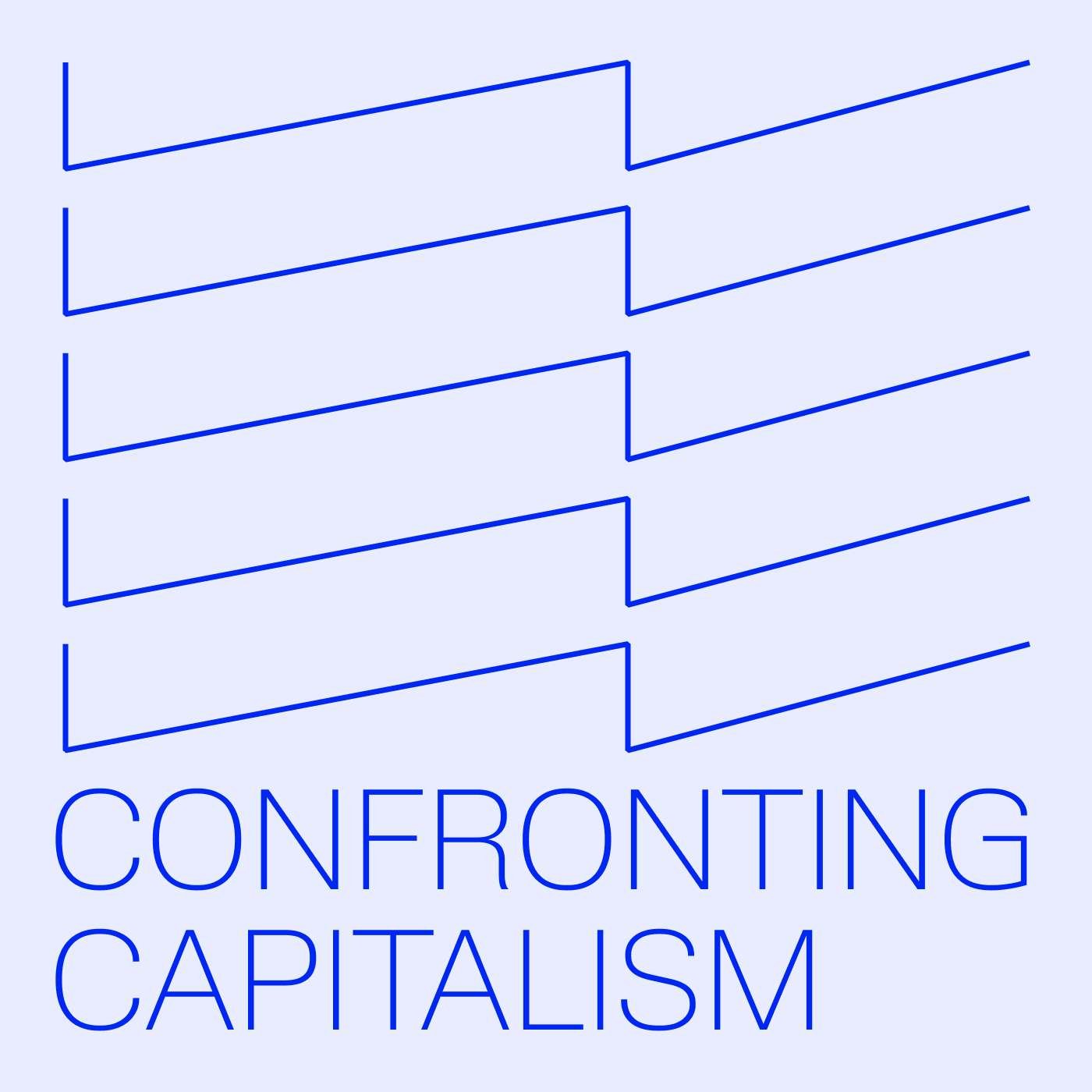Discover Jacobin Radio
Jacobin Radio

1756 Episodes
Reverse
Grab your coffee and your backpack — it's time for Professor Chibber's Office Hours!
On this episode of Confronting Capitalism, Vivek answers YOUR questions. We received so many interesting and thoughtful emails from listeners, we decided to dedicate a whole podcast to them. Vivek talks about how socialists should confront discrimination in their organizing, the relevance of the concept of monopoly capitalism, and the class implications of home ownership.
The latest issue of Catalyst is out and you can subscribe for just $20 using the code CONFRONTINGCAPITALISM:
https://catalyst-journal.com/subscribe/?code=CONFRONTINGCAPITALISM
Have a question for us? Write to us by email:
confronting.capitalism@jacobin.com
Confronting Capitalism with Vivek Chibber is produced by Catalyst: A Journal of Theory and Strategy, and published by Jacobin. Music by Zonkey.
Suzi talks to Capital & Main reporter Jesse Baum and David Williams, a Dollar General stocker and organizer with Step Up Louisiana, about how workers are fighting for dignity and better working conditions in “right-to-work” states — places where an anti-union climate, legal roadblocks, and intimidation make winning union recognition nearly impossible.
Dollar Store workers in Louisiana organized with Step Up Louisiana and won tangible gains despite the system being rigged against them. They used the Pre-Majority Unionism strategy — acting like a union without having one — walking out, marching on shareholders, and forcing companies to raise wages and improve safety and respect on the job. We talk about whether this organizing could chart a path forward for labor in the US’s low-wage sectors, short of unionizing.
Jacobin Radio with Suzi Weissman features conversations with leading thinkers and activists, with a focus on labor, the economy, and protest movements.
Ilan Pappé, author of Israel on the Brink, gives an update on the ceasefire and how the deepening crisis of Israeli society could lead to something better. Jennifer Berkshire examines the appalling Trump educational agenda.
Behind the News, hosted by Doug Henwood, covers the worlds of economics and politics and their complex interactions, from the local to the global.
Long Reads continues our recent focus on the politics of southern European countries over the last decade. This week and in our next episode, we’re looking in detail at what’s been happening in Spain.
In contrast with Greece and Portugal, Spain still has a government today headed by the center left. The Spanish Socialist leader Pedro Sanchez has attracted a lot of interest from the international media for appearing to buck the trend as many European countries shift to the right. He’s been unusually outspoken on the subject of Gaza. And Sanchez was the only European leader to directly challenge Donald Trump over his demand for a big increase in military spending.
Sanchez may be gaining admirers as well as enemies on the international stage. But his position at home is quite precarious. His governing coalition with the left-wing party Sumar doesn’t have a majority in parliament. And some of his political allies have been accused of corruption.
Over the next two episodes, Long Reads will concentrate on how Sanchez came to power, what his record in office has been, and whether his government is likely to endure.
Eoghan Gilmartin is an Irish journalist based in Madrid. He’s a regular contributor to Jacobin, and he co-hosts the Sobremesa podcast about Spanish politics.
Find his recent articles, including “Spain Is Right to Reject Increased Military Spending,” on the Jacobin website: https://jacobin.com/2025/06/trump-nato-spain-military-sanchez
Long Reads is a Jacobin podcast looking in-depth at political topics and thinkers, both contemporary and historical, with the magazine’s longform writers. Hosted by features editor Daniel Finn. Produced by Conor Gillies with music by Knxwledge.
Jake Werner of the Quincy Institute analyzes Trump’s creeping softness on China, and how that country sees its role in the world. Jeet Heer, author of a recent book review for the Nation, talks about the slick but odious William F. Buckley
Behind the News, hosted by Doug Henwood, covers the worlds of economics and politics and their complex interactions, from the local to the global.
Professor Tom Alter, a tenured historian at Texas State University, was recently fired for speaking at an online socialism conference. His remarks were secretly recorded and doctored by a self-proclaimed fascist influencer who launched a smear campaign. There was no due process, a blatant violation of his First Amendment and academic freedom rights. The president of Texas State University upheld the firing of Tom Alter after a court ordered his reinstatement. A broad coalition has formed to “Defend Tom Alter.” Tom joins Suzi to describe what happened and why his case has become a flashpoint in the new McCarthyism sweeping US campuses.
Then, longtime Chicano activist Bill Gallegos tells the story of how Los Angeles united to defeat Trump’s deployment of troops to enforce ICE raids and terrorize immigrant communities. Unions, immigrant organizations, artists, faith leaders, and even business groups built a united front demanding troops out — and they won. Trump’s troops were forced to withdraw. LA showed the country what resistance and broad solidarity can achieve: when people organize and stand firm, even a president bent on repression can be pushed back. LA was supposed to be Trump's model for his authoritarian power grab, but instead it was the template for defeating it.
Jacobin Radio with Suzi Weissman features conversations with leading thinkers and activists, with a focus on labor, the economy, and protest movements.
Featuring Melinda Cooper on Counterrevolution: Extravagance and Austerity in Public Finance. Balanced budget conservatism and supply side populism engineered a politics of austerity and budget deficits. Deep cuts to the social wage like welfare reform disciplined labor so severely that Fed chair Alan Greenspan opened the floodgates of easy money confident it would juice the price of assets alone. Assets like homes, the value of which spiraled ever upward until the global financial crisis. The crash made the politics of revolutionary conservatism that dominate us today with MAGA. But the crisis also revealed powerful monetary tools that we could wield to make socialism—if only we organize the power necessary to seize them.
The second in a two-part series.
Call in to leave a question for The Dig’s mailbag episode: speakpipe.com/ListenerMailbag
Support The Dig at Patreon.com/TheDig
Get your first month free at OVID.tv using promo code DIG25
Visit dropsitenews.com/DIG20 for 20% off an annual Drop Site subscription
The Dig goes deep into politics everywhere, from labor struggles and political economy to imperialism and immigration. Hosted by Daniel Denvir.
In this tumultuous political era, it’s common to hear that the Left needs to rebuild its historic sources of power. But it’s more accurate to say that the Left is essentially in the process of starting over again.
On this episode of Confronting Capitalism, we share Vivek Chibber’s keynote address at the Jacobin conference, “Socialism in Our Time,” which marked the 15th anniversary of the magazine. He discusses how capitalism has changed since the turn of the century, how the Left has been neoliberalized, and why Zohran Mamdani’s campaign may point in a new direction.
The latest issue of Catalyst is out and you can subscribe for just $20 using the code CONFRONTINGCAPITALISM: https://catalyst-journal.com/subscribe/?code=CONFRONTINGCAPITALISM
Have a question for us? Write to us by email: confronting.capitalism@jacobin.com
Confronting Capitalism with Vivek Chibber is produced by Catalyst: A Journal of Theory and Strategy, and published by Jacobin. Music by Zonkey.
At the end of September, political theorist Ilya Matveev joined the Critique editorial board to present his ideas about imperialism in the 21st century. Suzi Weissman moderated that enlightening discussion and brings it now to Jacobin Radio.
Matveev examines the emerging era of inter-imperialist rivalry and asks what’s really driving the strategies of Russia, China, and the United States. China has risen as a manufacturing superpower, with national capital tightly fused to the party-state. Russia, in a neo-fascist turn, has shattered the global free-trade order with its invasion of Ukraine. The United States, still unmatched in military and financial power, confronts both as rivals even as Trump’s second administration dismantles the alliances and institutions that once underpinned American primacy.
What theories of imperialism can help us make sense of this fractured world order? Matveev argues that to grasp today’s disjointed global system, we must reckon not only with the structural contradictions of capitalism but also with the sovereign decisions and ideological projects of political elites.
Jacobin Radio with Suzi Weissman features conversations with leading thinkers and activists, with a focus on labor, the economy, and protest movements.
Erin Thompson considers the politics of public monuments as Trump talks of restoring Confederate statues. Mouin Rabbani returns for a look at Trump’s dubious Gaza peace scheme. Ted Hamm, author of Run Zohran Run!, discusses Mamdani’s campaign for NYC mayor.
Behind the News, hosted by Doug Henwood, covers the worlds of economics and politics and their complex interactions, from the local to the global.
This week’s episode of Long Reads is the second in a two-part interview. In our last episode, we spoke to Catarina Príncipe about the politics of Portugal since 2015. Today we’re going to cover developments from 2022 onward.
One of the main themes in that period has been the rise of the far right. In 2022, the parties of the radical left, the Communist Party and the Left Bloc, lost ground and were no longer part of the governing majority. In this year’s general election, the right-wing Chega Party became the second-largest force in the Portuguese parliament. Chega’s breakthrough came at the expense of the Portuguese Socialist Party, which now had the third-largest group of MPs. For the Socialists, it represented a dramatic fall in the space of three years.
Catarina Príncipe is a contributing editor for Jacobin and she co-edited the book Europe in Revolt. She’s also a member of the Left Bloc.
Listen to the first part of the interview here: https://apple.co/4mmUUec
Read Catarina’s article “How Portugal’s Right Won the Election” here: https://jacobin.com/2024/03/portugal-right-wing-chega-election
Long Reads is a Jacobin podcast looking in-depth at political topics and thinkers, both contemporary and historical, with the magazine’s longform writers. Hosted by features editor Daniel Finn. Produced by Conor Gillies with music by Knxwledge.
Featuring Melinda Cooper on Counterrevolution: Extravagance and Austerity in Public Finance. Neoliberalism remade the American economy into an engine for the appreciation of assets stretching from the single-family suburban home to the stock market. This revanchist offensive sought to enforce not only the class order and fiscal rectitude but also gender, sexual, and racial hierarchies.
The first in a two-part series.
Call in to leave a question for The Dig’s mailbag episode: speakpipe.com/ListenerMailbag
Support The Dig at Patreon.com/TheDig
Buy Challenging the Myths of US History at UCPress.edu
Buy Trouble! at Coal Creek at Haymarketbooks.org
The Dig goes deep into politics everywhere, from labor struggles and political economy to imperialism and immigration. Hosted by Daniel Denvir.
Thomas Ferguson has investigated money in politics for decades, and he has found, over and over again, that money and election outcomes are directly linked.
He joins Suzi to talk about how Silicon Valley, finance, defense, and crypto have fused into what he calls “red tech.” Ferguson explains why the Democrats’ crisis isn’t about messaging — it’s about failing to deliver for working people while catering to donors. We dig into the investment theory of politics, the K-shaped recovery, crypto’s bipartisan capture, and the structural impasse at the heart of the Democratic coalition.
What does this new tech-capital bloc mean for labor, democracy, and the future of US politics?
Jacobin Radio with Suzi Weissman features conversations with leading thinkers and activists, with a focus on labor, the economy, and protest movements.
Mouin Rabbani explains what is behind all these fresh diplomatic recognitions of Palestine and speculates on the future of Gaza. Ernesto Semán, author of a recent piece for the New York Review of Books, looks at the Argentine situation and the US bailout of the libertarian Javier Milei.
Read Mouin’s article “The Meaning of Western Recognition of Palestine” here: https://jacobin.com/2025/09/recognition-palestine-israel-genocide-zionism
Behind the News, hosted by Doug Henwood, covers the worlds of economics and politics and their complex interactions, from the local to the global.
It’s well understood that capitalist economies are a recent development in human history. But there is persistent disagreement on the Left over exactly how and where the transition to capitalism occurred, as well as what role colonial plunder played in enriching the West.
On this episode of Confronting Capitalism, Vivek Chibber explains the origins of capitalism, what primitive accumulation means, and how colonialism actually affected European development.
The latest issue of Catalyst is out and you can subscribe for just $20 using the code, CONFRONTINGCAPITALISM: https://catalyst-journal.com/subscribe/?code=CONFRONTINGCAPITALISM
Have a question for us? Write to us by email: confronting.capitalism@jacobin.com
Confronting Capitalism with Vivek Chibber is produced by Catalyst: A Journal of Theory and Strategy, and published by Jacobin. Music by Zonkey.
The Roberts Court gave Trump sweeping immunity — and he’s using it to intimidate critics, greenlight ICE’s racial profiling raids, extort universities, law firms, corporations, and foreign governments, and crack down on political speech. Pema Levy of Mother Jones joins Suzi to unpack the landmark decision in Trump v. United States, a ruling that didn’t just grant Trump protection for official acts but armed him with the ability to wield the Justice Department as a personal weapon against political rivals. It’s as if the DOJ were Trump’s private legal office. Levy traces how legal and political practices are converging in an authoritarianism that threatens us all.
Jacobin Radio with Suzi Weissman features conversations with leading thinkers and activists, with a focus on labor, the economy, and protest movements.
Featuring Alberto Toscano and Stuart Schrader on Trump’s intensification of police, ICE, and military repression. What does this all reveal about MAGA’s fascist and authoritarian project — and about the illiberalism already immanent in the US carceral and imperialist state? This is the second in a two-part series.
Call in to leave a question for The Dig’s mailbag episode: speakpipe.com/ListenerMailbag
Support The Dig at Patreon.com/TheDig
Visit dropsitenews.com/DIG20 for 20% off an annual Drop Site subscription.
Buy Gaza Catastrophe at UCPress.edu
The Dig goes deep into politics everywhere, from labor struggles and political economy to imperialism and immigration. Hosted by Daniel Denvir.
Quinn Slobodian, author of Hayek’s Bastards, speaks about the eugenics/race science tendencies within High Church Neoliberalism. Molly White looks at stablecoins and the Trump–UAE deal.
Behind the News, hosted by Doug Henwood, covers the worlds of economics and politics and their complex interactions, from the local to the global.
Long Reads spoke to Yanis Varoufakis earlier in the year to mark the tenth anniversary of the Greek referendum on the austerity programs of the European Union. This week, we’re going to be looking at another country that bore the brunt of Euro-austerity after the 2008 crash.
Ten years ago, the Portuguese Socialist leader Antonio Costa formed a government with the support of two radical-left parties, the Left Bloc and the Communist Party. Costa’s government appeared to be a success story for the European center left at a time when most of its parties were losing ground. Portugal also stood out as one of the few West European countries where the far right was still a marginal force.
Costa’s party increased their vote share in 2019 and he remained in office. In the election of 2022, the Portuguese Socialists even won an absolute majority. But Costa resigned as prime minister two years later and his party lost power after the fourth general election in less than a decade.
Another general election this year was a disaster for the Socialist Party and the radical left. With just over 20 percent of the vote, the Socialists were now on a level footing with the far-right party Chega. The combined vote share for the Left Bloc and the Communist Party was less than a third of the figure from 2015.
Our guest today for a conversation about the last decade of Portuguese politics is Catarina Príncipe. Catarina is a contributing editor for Jacobin and she co-edited the book Europe in Revolt. She’s also a member of the Left Bloc.
This week’s episode is the first of a two-part interview. Today we’re going to cover the period from 2015 until the general election in 2022.
Listen to the second part here: https://apple.co/46z7qmw
Read Catarina’s article “How Portugal’s Right Won the Election” here: https://jacobin.com/2024/03/portugal-right-wing-chega-election
Long Reads is a Jacobin podcast looking in-depth at political topics and thinkers, both contemporary and historical, with the magazine’s longform writers. Hosted by features editor Daniel Finn. Produced by Conor Gillies with music by Knxwledge.
Featuring Alberto Toscano and Stuart Schrader on Trump’s intensification of police, ICE, and military repression. What does this all reveal about MAGA’s fascist and authoritarian project—and about the illiberalism already immanent in the US carceral and imperialist state? The first in a two-part series.
Support The Dig at Patreon.com/TheDig
Call in to leave a question for The Dig’s mailbag episode: speakpipe.com/ListenerMailbag
Get your first month free at OVID.tv using promo code DIG25
Buy Learning to Live in the Dark at Haymarketbooks.org
The Dig goes deep into politics everywhere, from labor struggles and political economy to imperialism and immigration. Hosted by Daniel Denvir.

























My god, he's doing class reductionism again. Jk.
The Soviet Union's mistake was not rooting out liberals more vigorously.
Liberals in 2025 are just as right wing as Buckley and it's nauseating.
Buckley's anti-communism deserves praise? Because Tsarist, anti-semite, crank Solzhenitsyn liked him? Fuck Buckley, fuck Henwood, and fuck Sam.
Hell yeah, let's keep this motherfucker going. More money, more weapons, no term limit for Zelensky. It's left-wing solidarity.
the musical break sucks fucking dick, this is Henwood's doing.
Yeah, an extremely corrupt, post Soviet country being invaded by another corrupt, post Soviet country in the context of an unnecessary (and explicitly defined) proxy war is really similar to Munich. I'm not sure about Jacobin as a whole but the Susie Weissman branch of things is a NATO cutout. But it's actually left-wing, you see. Keep the money, weapons, and conscriptions flowing even though the Ukrainians don't stand a ghost of a chance, it's for democracy.
Jacobin has gotten very, very west friendly and it's a tad suspicious.
No one should take up arms for Russia. They definitely shouldn't throw their lives away for a corrupt, right-wing, NATO proxy like Ukraine.
Imagine the consequences of fire bombing anything in the US or UK.
I'm not finishing this episode but out of curiosity: do we actually think black and brown working class men are woke, for the most part? Neither of you are working class by any reasonable metric.
Being "woke" means different things to different people and doesn't really merit discussion.
This guy is pure, Zionist scum.
Jolani never had any intention of attacking Israel, for obvious reasons.
"they were fighting for a nation" They already had a nation, it was called Yugoslavia you fucking imperialist reactionary.
I ❤️ Liz & Brace
I'm too stupid to understand the second interview 🥲😭
Christopher Ketcham is a malthusian. Why is he on the Jacobin feed for podcasts? His views are far from socialist. His ideas are sociopathic.
Your podcast self-describes as being "about political cinema and our crumbling world." Why do you waste our time talking for so long about your "adventure" and canoeing and portaging?! How fucking self-absorbed can you be? GTFOH! 😄 @Jacobin Magazine! Is this horseshit the kind of content you produce for "Reason In Revolt" now?
count the number if times Nadia says "right" at the end of a sentence. I stopped at 100. Can she be more condescending or is it a subconscious tic that reveals how insecure she is in her field?